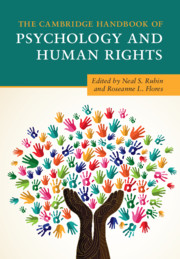Book contents
- The Cambridge Handbook of Psychology and Human Rights
- The Cambridge Handbook of Psychology and Human Rights
- Copyright page
- Dedication
- Contents
- Figures
- Tables
- Boxes
- Contributors
- Acknowledgments
- The Core International Human Rights Instruments and Their Monitoring Bodies
- Universal Human Rights Instruments
- Sustainable Development Goals
- Glossary of United Nations and Psychology Acronyms in the Handbook
- Introduction
- Part I History of Human Rights
- Part II The Intersection of Psychology and Human Rights
- Part III Contemporary Issues in Psychology and Human Rights
- Part IV Teaching, Research, and Training in Psychology and Human Rights
- Part V Future Directions
- Index
Introduction
Published online by Cambridge University Press: 02 October 2020
- The Cambridge Handbook of Psychology and Human Rights
- The Cambridge Handbook of Psychology and Human Rights
- Copyright page
- Dedication
- Contents
- Figures
- Tables
- Boxes
- Contributors
- Acknowledgments
- The Core International Human Rights Instruments and Their Monitoring Bodies
- Universal Human Rights Instruments
- Sustainable Development Goals
- Glossary of United Nations and Psychology Acronyms in the Handbook
- Introduction
- Part I History of Human Rights
- Part II The Intersection of Psychology and Human Rights
- Part III Contemporary Issues in Psychology and Human Rights
- Part IV Teaching, Research, and Training in Psychology and Human Rights
- Part V Future Directions
- Index
Summary
This handbook demonstrates the central role psychological science has played in the past, and continues to play, in addressing some of the world’s most pressing problems. It addresses the following questions: How has psychological science contributed to the realization and respect of human rights since the inception of the Universal Declaration of Human Rights (UDHR)? How can psychological science be used to help state parties and the global community attain the United Nations’ Sustainable Development Goals (SDGs)?
This handbook was conceived to celebrate the seventieth anniversary of the Universal Declaration of Human Rights (UDHR), yet imposing human rights challenges continue to persist throughout the world today. From a global migration crisis to extreme poverty, from the damaging effects of climate change to the dehumanizing impacts of racism and discrimination in communities of color, from the trafficking of human beings to the bioethical issues raised from the explosion of scientific innovation, humanity continues to struggle to achieve the aspirations set forward in the UDHR in the aftermath of World War II.
- Type
- Chapter
- Information
- Publisher: Cambridge University PressPrint publication year: 2020



